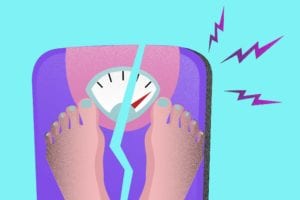If you have psoriatic arthritis (PsA), an inflammatory joint condition that’s often accompanied by skin psoriasis, you may already know that one of the most important lifestyle changes you can make is to maintain a healthy weight or lose weight if you’re overweight. Fat cells release inflammatory substances; plus being overweight may interfere with the effectiveness of drugs that are often used to treat PsA.
Now a new study, presented at the annual European Congress of Rheumatology (EULAR 2019) in Madrid, further confirms that obesity and PsA are a bad combo. While earlier research has shown that people who are overweight or obese are more likely to develop PsA, this new study specifically looked at the impact of weight on disease activity.
Researchers led by Stefan Siebert, a clinical senior lecturer in inflammation and rheumatology at the University of Glasgow in Scotland, analyzed data on 917 PsA patients and found that those with a higher body mass index (BMI) were more apt to have greater disease activity and more PsA-related disability. These associations held up even after the authors adjusted for other factors including age, smoking status, and disease duration.
“Our results highlight the impact of obesity and need for lifestyle-directed approaches to manage weight in psoriatic arthritis in parallel to joint and skin focused treatments,” said Dr. Siebert in a press release.
If you’re currently overweight, following a Mediterranean-style diet — which features fruits and vegetables, whole grains, and fish — might help you slim down and, in turn, possibly improve your PsA symptoms. (At the very least, it’s likely to reduce your heart disease and type 2 diabetes.) But it’s best to talk to your doctor or a registered dietitian and choose an eating plan that works best with your lifestyle. Getting regular, low-impact exercise is also a smart move, both for maintaining your weight and keeping PsA well-controlled.
Keep Reading
Subscribe to CreakyJoints
Get the latest arthritis news in your inbox. Sign up for CreakyJoints and hear about the latest research updates and medical news that could affect you.






